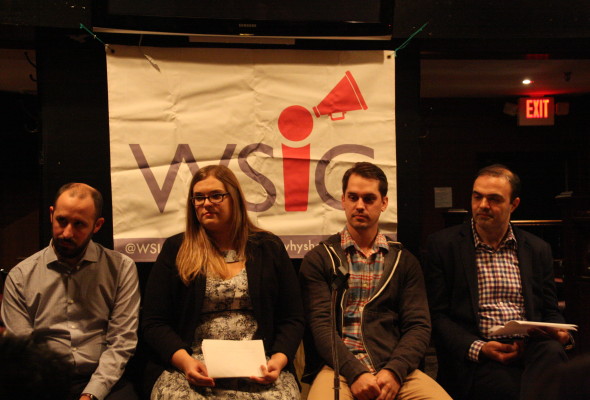In November, Why Should I Care was happy to have a large panel to discuss the sharing economy, the role of government and what can be done for the future.
The varied panel included Noah Zon from the Mowat Centre, Liam McGuinty from the Ontario Chamber of Commerce and Ashley Csanady and Hamid Akbari, CEO of BlancRide.
Noah began the event by giving a general definition of sharing economy. The sharing economy can be either the sharing of assets for a short-term basis or the idea of “product-as-a-service”. Both definitions include a strong tech component and both offer opportunities and challenges.
Noah state the with the sharing economy, the role of public policy to maximize opportunities and minimize challenges. This is difficult for a variety of reasons, including government involvement and regulation, the blurring of the line between what is personal and what is commercial and the blurring of the line of where government should get involved. As this line blurs, governments need to to rethink current rules and regulations. They must balance various aspects, including competition and a level playing field along with consumer protection (ie. vulnerable groups, people with disabilities) and the labour market and labour rules. All these factors must be balanced with the opportunity for innovation.
As noted, government moves slow for institutional reasons (need to evaluate, committee hearings, public consultations etc. these things take time). Noah also astutely noted that our currently political culture that punishes the government for getting things wrong rather than rewarding them for getting things right in regards innovation. As such, it is imperative that governments figure out how to get this right.
Ashely added some interesting points, and also brought in the political context. She discussed Tim Hudak’s Private Members’ Bill to regulate the sharing economy (including ride sharing, home sharing and parking sharing). She noted that the Liberal Cabinet did in fact vote for this bill, which shows their commitment and interest in the sharing economy.
She also noted that the rise of the sharing economy is also being seen as a rejection of the law, and as such, politicians needs to keep pace with the times. This is happening in other Canadian jurisdictions, as Quebec is looking to regulate Uber.
Liam discussed the sharing economy from the point of businesses. The Ontario Chamber of Commerce currently represents 60,000 businesses, only 2 are members of sharing economy. However, he notes that this industry is worth $15 billion. As such, they are asking their members what share of the sharing economy do their members want to capture.
He noted that 70% of Ontarians polled think the sharing economy is a good idea and this is changing of perception of how government should approach this. As such, this means that regulation must be smart and adaptable.
However, it was also mentioned that there are still aspects of the sharing economy that have yet to be fully addressed. For instance, there is the growth of contract/temporary work. Therefore, what role is the sharing economy playing into this. For instance, what are the implications of this from a social safety net? insurance, benefits, healthcare. Will the sharing economy be contributing to this? Or are they supplementing this? Liam was insistent that all these unknowns illustrate the strong need for Canadian data and data can lead to regulation.
As the CEO of Blancride, a ride-sharing service, Hamid offered the unique perspective of someone who works in the sharing economy. He agreed with what all the speakers said and added that the government needs to work to anticipate progress and that guidelines and regs needs to be scalable, adaptable and open to all people to enter the market.
The audience was clearly engaged, and questions ranged from how do we ensure that the sharing economy does not amplify existing issues like discrimination: its about promoting inclusion and additional discussion about what role does the regulatory regime play.
The questions also touched on lead jurisdictions (Munich has very clear regulations, the UK looks at regulation in a much broader sense and some US states, such as Portland and Oregon have users sign waivers. One question even touched on the unique and “broken”, as one speaker put it, taxi licensing system that the city currently uses.
From the breadth of questions and discussions, it is clear that citizens are very engaged in the sharing economy, and clearly it is not going anywhere. A special thank you to Noah, Ashley, Liam and Hamid for your insights and expertise.







